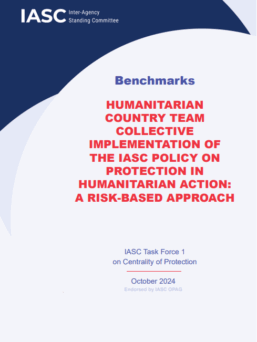In 2011, the IASC Principals agreed to five Commitments on Accountability to Affected Populations (CAAP) as part of a framework for engagement with communities. The revised version was developed and endorsed by the IASC Principals in November 2017 to reflect essential developments such as the Core Humanitarian Standard (CHS), the work done by the IASC on inter-agency community-based complaints mechanisms including PSEA, and the importance of meaningful collaboration with local stakeholders, which came out as a priority recommendation from the 2016 World Humanitarian Summit and in the Grand Bargain.
Following the release of the revised Commitments on Accountability to Affected Populations, the IASC AAP/PSEA Task Team has published a two-page guidance note for principals and senior managers to accompany them, highlighting the relevant links to the Grand Bargain’s Participation Revolution recommendations and the Core Humanitarian Standard. Within each of these Commitments, the note highlights the key elements of RBP, and the importance of starting from the perspective of those experiencing violence, coercion, and deliberate deprivation, as demonstrated in the following recommendations:
-
OUTCOME-ORIENTED METHODS:
- Work with relevant local and national partners and actors, including through targeted outreach to women’s civil society organizations, advocacy groups for disability groups, LGBTI persons, and/or specific age groups, in support of effective design, implementation and monitoring of the response as well as designing ways they may meaningfully participate in influencing or creating this response. (Commitment: Participation and Partnership)
- Communicate in languages, formats and media that are easily understood, respectful and culturally appropriate for different members of the community, especially vulnerable and marginalised groups. (Commitment: Information, Feedback, and Action)
- At a programme/operational level, require the inclusion in standard reporting of information about how programming has been adapted to take the views and perspectives of affected people into account. (Commitment: Information, Feedback and Action)
-
MULTI-DISCIPLINARY STRATEGIES
- Recognise and use existing local and national mechanisms for coordinated approaches to participation; recognise when these do not adequately capture the needs, voices and leadership of women and girls and marginalised groups; and if so, identify alternative methods of reaching these. (Commitment: Participation and Partnership)
-
ORGANIZATIONAL CULTURE, SYSTEMS, AND RESOURCES
- Allocate funds to enable effective participation and promote a culture among staff of acceptance of failure and negative feedback from affected people. (Commitment: Leadership)
- Update TORs for relevant staff and managers to require collecting feedback from affected women and men, and girls and boys in appropriate age groups in ways that are sensitive to gender & age; respond to this feedback; and report back on this feedback including how it has been addressed. Staff recruitment and performance management systems to incorporate a requirement to measure responsiveness to feedback. (Commitment: Leadership)
- The CDAC Network and the IASC AAP/PSEA Task Team have also developed a matrix of resources (above) for Communicating with Communities and Accountability to Affected Populations to provide a list of tools, guidance and case studies, in support of the 4 revised AAP Commitments for use at organizational and collective levels and help managers and practitioners navigate the various resources available.



